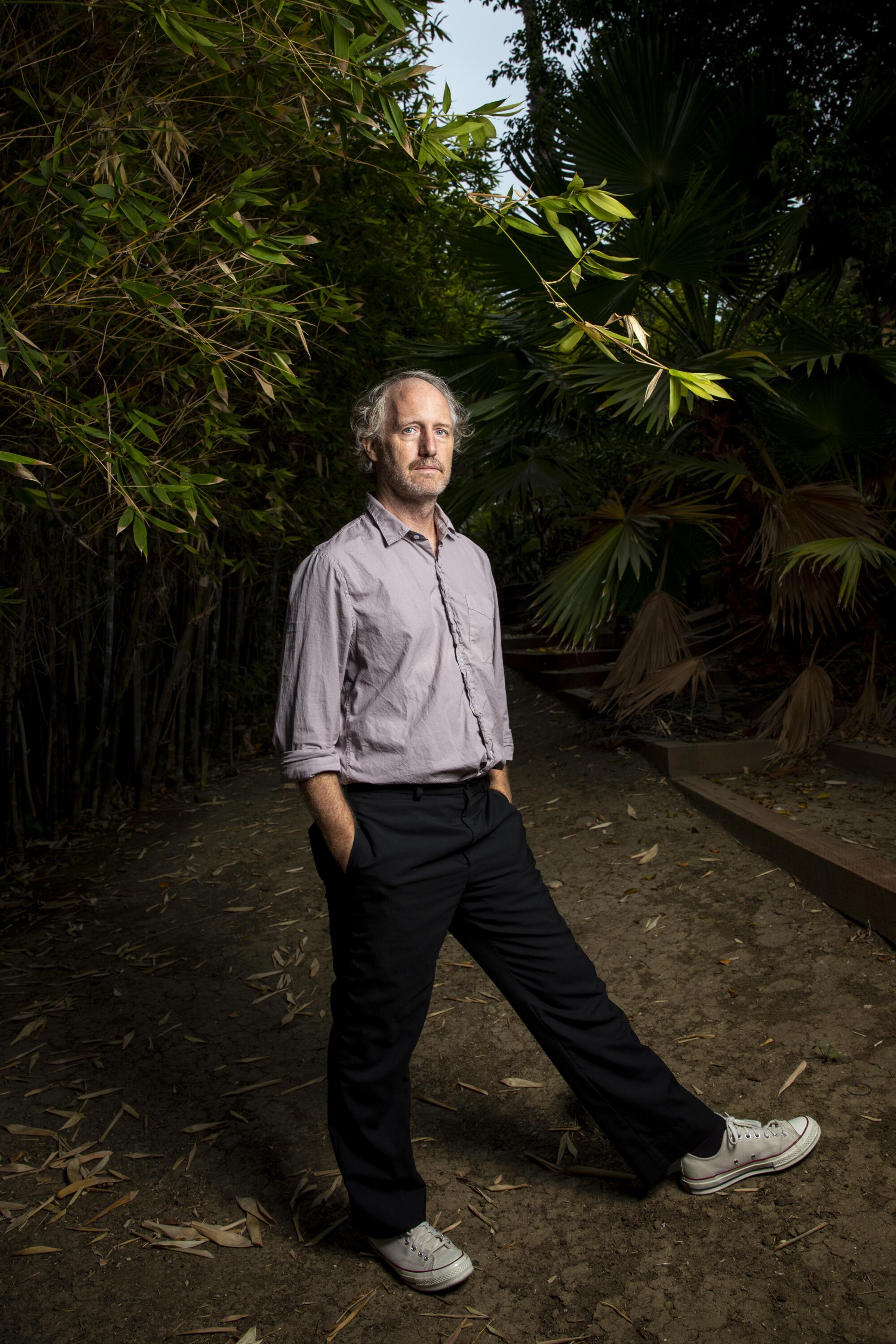
- Share via
TELLURIDE, Colo. — Writer-director Mike Mills is a deeply sensitive person — “too sensitive,” he’ll tell you. So as thrilling as it was to see his new film “C’mon C’mon” have its world premiere at the 2021 Telluride Film Festival, he didn’t have the easiest time getting through it.
Already a bit freaked out by the idea of being around so many people in the middle of a pandemic, Mills stood in the back of the theater, looking for signs that the audience was on the wavelength of his tender, open-hearted story of a radio journalist named Johnny (Joaquin Phoenix) who forges an unexpected emotional bond with his precocious nephew, Jesse (Woody Norman), during a cross-country trip.
“I can talk myself into thinking everything’s broken,” Mills says two days later over coffee. “I kept feeling like I was seeing glitches or the sound was going out. It was like I was tripping hard, I was so anxious. You really don’t know if it’s going to work at all or if it’s like you’re speaking Russian. But the audience was laughing, which was nice, and then people were really emotional at the end. So I knew something happened, some communication landed.”
Mills need not have worried. “C’mon C’mon,” which A24 is set to release in November, emerged as one of the most admired films in what was widely considered a strong field at Telluride. Already many Oscar prognosticators are predicting that the intimate, black-and-white film — which explores the joys and struggles of parent-child relationships, the deep human need for connection and the difficulty today’s kids face growing up in a world that seems to be spinning out of control — will punch above its weight as awards season rolls on.
“I think people are so grateful to have a story in front of them that is about so much of what life is about,” says Gaby Hoffmann, who plays Viv, Johnny’s sister and the mother of Jesse. “People are just streaming out of the film, sobbing, weeping. We’re all deeply vulnerable all the time but that is stretched in so many directions right now. We’re all in need of connecting and seeing one another and caring for one another, and to me the movie is about confronting that need.”
The 55-year-old Mills has a gentle, self-effacing manner in person, and speaking to him one gets the sense that the world can sometimes be a lot for him to take. He spurns social media. He deleted the web browser, email and virtually every other app from his phone. (“It’s a lobotomized very expensive phone,” he says dryly.) He tries to avoid all talk of awards buzz (no easy feat at a place like Telluride), finding it “mildly toxic.”
But the same hypersensitivity that at times makes Mills want to shield himself from the onslaught of life also has been his greatest strength as a filmmaker.
After his 2005 feature debut, “Thumbsucker,” Mills’ next two films — 2010’s “Beginners” and 2016’s “20th Century Women” — drew from the wellspring of his own complicated upbringing. Following the death of Mills’ mother, his father, after 45 years of marriage, came out as gay. The movies represented Mills’ effort to capture and make sense of both parents in all their complicated, unconventional, messy glory.
Both films were praised by critics for their emotional acuity and proved respectable-sized indie hits, grossing in the neighborhood of $7 million domestically. Christopher Plummer won the supporting actor Oscar for “Beginners,” while Mills earned an original screenplay nomination for “20th Century Women.”
Mills remains endlessly fascinated with our relationships with those with whom we’re the closest — and from whom we’re sometimes the furthest apart.
“I’m a very therapized person — I have enjoyed therapy,” says Mills, who is married to filmmaker Miranda July. “I feel like those core primary relationships are the way you build out your whole life. And it’s such a crazy world, the family world. It’s like ‘Game of Thrones.’ The biggest stakes are in that kind of space.”
High-profile contenders including “Spencer,” “The Power of the Dog,” “King Richard” and “Belfast” kick off an Oscar season that’s looking like old times.
“C’mon C’mon” mines similarly autobiographical terrain, drawing on Mills’ relationship with his deeply inquisitive, wise-beyond-their-years child, Hopper (who is gender-nonconforming and uses the pronouns they/them.)
In 2016, after “20th Century Women,” Mills — who also has a successful career directing commercials and music videos — was casting around for an idea for his next movie, a process he typically finds agonizing under the best circumstances. One day, he was giving Hopper a bath and, while the two were talking, he was suddenly struck with the thought, “I want to make a movie about this.”
“Hopper was saying something kind of profound and making my understanding of the world deepen in a way that was really challenging and strange, and I thought, ‘This is it, this little space. Here’s what I want to do,’” Mills says.
Drawing upon his own experience with Hopper, his observations of other parents and kids and a particularly empathetic and emotionally astute teacher at Hopper’s preschool, Mills started working on a script. Wim Wenders’ 1974 road movie “Alice in the Cities” — about a childless German journalist who forms an unlikely bond with a 9-year-old girl left in his care — served as a kind of creative touchstone.
“Hopper was 6 when I was writing it but they’re 9 now,” Mills says. “In 2016, I got very lost in Trump world and I felt super discombobulated. I’d watch ‘Alice in the Cities’ as, like, a medicine situation. I knew I wanted to try to do something about being a parent, about all those experiences, and the two kind of came together.”

Inspired by “Alice in the Cities” and by Peter Bogdanovich’s 1973 “Paper Moon,” Mills conceived a story in which a childless, middle-aged journalist — while working on a radio documentary project interviewing teenagers about the future — finds himself needing to care for the bright and idiosyncratic young nephew from whom he’s been estranged.
“A lot of it comes from direct observation,” Mills says of the script. “I really love my kid and I love being a dad, and we go on a lot of trips together, me and them. I couldn’t get too specific; I didn’t want to throw too much of a shadow across Hopper’s path. But there’s a fair amount in the film that’s right out of my life, just transformed a bit.”
Mills had long wanted to work with Phoenix, and after a months-long process in which the two broke down every aspect of the script and Johnny’s emotional journey — acting out the whole film piece by piece, with Mills doing all the other parts, in sessions that could run four or five hours — the actor agreed to come on board.
“It was so collaborative and fun,” Mills says. “Joaquin just made it less predictable and less me trying to make sure I come off good. He’s really good at smelling that kind of virtue signaling in different ways.”
The role of Johnny in “C’mon C’mon” couldn’t be more starkly different from Phoenix’s Oscar-winning turn in his previous film, 2019’s dark, disturbing “Joker” — a prospect Mills says the actor relished.

Joaquin Phoenix in Mike Mills’ “C’mon C’mon”
”That was a super conscious [choice],” Mills says. “Joaquin is smart. He knew what a 180 this would be, and that was on my side.”
To play Jesse, Mills cast Norman, who is British, after being charmed by the tape he submitted during the casting process. “In lots of ways Woody was the most mature person on the set,” says Mills. “He’s a very deep-ruddered person. He really relished digging into the heavier emotions. Most kid actors have been a little bit too trained but Woody was exceedingly good at just falling into the moment and being there and kind of forgetting all the stuff that was around.”
The film is also, Mills says, “an ode to motherhood.” Taking on the role of Viv — who reluctantly entrusts Jesse to her brother’s care while she tries to help her mentally ill husband (Scoot McNairy) — Hoffmann was impressed by Mills’ uncanny ability to get inside the maternal mind.
“I myself am a mother and when I read the script, it was this odd experience of feeling like he was writing scenes that I’d written myself in my head, based on the experience I was having,” Hoffmann says. “Viv just felt very familiar to me, and she felt like many women I know. But she also felt distinct in her own right because she was so well drawn by Mike.”
For a filmmaker, there are few things more challenging than seamlessly interweaving comedy and drama; even the word dramedy is awkward to say out loud. But for Mills, that is his comfort zone, and “C’mon C’mon” is filled with scenes in which an emotionally wrenching moment is undercut with a goofy joke, or a light-hearted one turns suddenly melancholy.
“That’s just how I see the world,” Mills says. “There are no borders; funny and sad don’t stay in their lanes. Maybe I have a sort of emotional ADD but I don’t want to be strictly in just one of those spaces.”
Even as he has enjoyed the reception “C’mon C’mon” has received thus far, Mills is well aware that small-scale black-and-white films exploring the emotional minefield of family relationships are not generally considered box-office gold in today’s entertainment landscape. “I was lucky I had Joaquin,” Mills says. “If not, I don’t know what would have happened.”
Mike Mills directs Joaquin Phoenix in an effective examination of work and family life, one of the early Telluride ‘21 highlights.
As the film industry struggles to emerge from the pandemic, it is movies like “C’mon C’mon” that are in the most precarious position. Then again, Mills has never really set out to place himself at the white-hot center of Hollywood.
For all Mills might worry about the continued appetite for his own highly personal, emotionally nuanced brand of filmmaking, it’s all he knows how to do — or wants to do. “I don’t think I’m, like, such an amazing writer but it’s definitely so key to everything I do,” he says. “To me, that’s filmmaking.”

As for the business that sustains that filmmaking, “Who knows what’s going to happen?” he says with a shrug. “I’m barely in the industry, and I don’t think my answers on it are very informed or interesting. I hear other people talk and I’m like, ‘Oh, wow, really?’
“After each film, I never think I’m going to get to do it again,” he continues. “Sometimes I feel like, ‘OK, cool, I’m way outmoded — and that’s maybe slightly radical.’ That’s my only hope of radicalism. I feel like I’m writing novels in a world that’s really into something else. And if I can make a couple more — three more, maybe? — then I would be very lucky.”
More to Read
Only good movies
Get the Indie Focus newsletter, Mark Olsen's weekly guide to the world of cinema.
You may occasionally receive promotional content from the Los Angeles Times.











